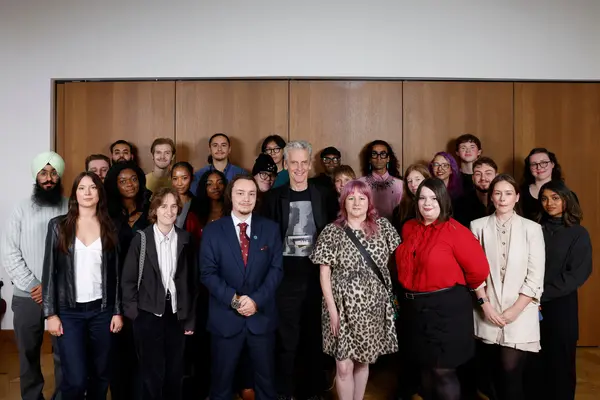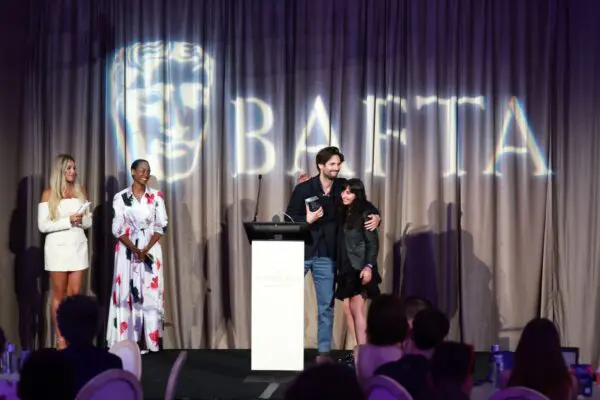- Award-winning director, producer and writer Shane Meadows gave BAFTA’s annual lecture at BAFTA’s 195 Piccadilly HQ yesterday evening
- BAFTA publishes cross-industry guide on socio-economic barriers in the screen arts today, featuring 16 leading creatives and practitioners, including Danny Brocklehurst, Aisha Bywaters, Shane Meadows, Jack O’Connell, Charlotte Regan and Moo Yu
- The 60-page free-to-use guide for hirers and practitioners explores authentic representation and storytelling, and how to attract and retain talent from low socio-economic backgrounds
BAFTA award-winning director, producer and writer Shane Meadows delivered BAFTA’s prestigious David Lean Lecture yesterday evening. A transcript of the lecture can be read in full here.
Shane Meadows’ prolific and acclaimed body of work offers nuanced and ambiguous explorations of everyday life in Britain. A self-taught, British filmmaker from the Midlands in the UK, he is perhaps best known for multi award-winning film This Is England (2006) and its three follow-up television series (2010–2015). His feature credits also include Smalltime, Twenty Four Seven, Dead Man’s Shoes, A Room for Romeo Brass and Somers Town, and television credits include The Virtues, The Stone Roses: Made of Stone, and three-part television series The Gallows Pole, which aired earlier this year.
In his lecture, Meadows reflected on the beginnings of his career, discovering films and filmmaking, learning from his mistakes – and how a number of people mentored him and helped hone his craft and confidence in the early stages of his career.
The David Lean Lecture is a flagship event in BAFTA’s year-round public programme, and is generously supported by The David Lean Foundation, which continues to spotlight excellence in British filmmaking. The series has previously hosted directors including Ryan Coogler, Martin Scorsese, Lone Scherfig, Pedro Almodóvar, Ken Loach, and Spike Lee.
Earlier this year, BAFTA set out a renewed focus on tackling class inequality in light of the challenging climate for many people working in the screen industries today, as well as those considering a career in film or TV without existing connections or financial support. Building on this work, BAFTA today publishes a comprehensive new resource titled ‘Invisible Barriers’ to support hirers, executives and practitioners from talent managers to commissioners, producers and games developer leads, to become more class-aware in their practices.
The 60-page free-to-use guide includes over 30 recommendations from 16 leading creative and industry experts for widening access and progression in the screen arts for those from low socio-economic backgrounds, as well as highlighting ideas for authentic representation and storytelling on-screen. The guide can be read in full here.
Testimonials include:
- Philip Barantini, BAFTA-nominated screenwriter and director (Boiling Point), on character briefs that are often too specific and how he’s adapted them to be more inclusive.
- Danny Brocklehurst, screenwriter (Ordinary Lies, Brassic), on depicting the joy and laughter of working-class characters and not only negative traits.
- Aisha Bywaters, BAFTA-winning casting director (The Last Tree, We Are Lady Parts) on types of additional support that can help those from non-traditional backgrounds to thrive.
- Shane Meadows on creating a casting process that brings the best out in actors.
- Jack O’Connell, actor, BAFTA EE Rising Star winner (’71, Unbroken), on the funding avenues and talent schemes that helped develop his career.
- Charlotte Regan, screenwriter and director, BAFTA Breakthrough 2023/4 participant (Scrapper) on the lack of visibility of existing talent schemes and the need for more grassroots outreach.
- Rhys Yates, actor, BAFTA Elevate participant (The Outlaws, Unforgotten) on the benefit of participating in a funded social inclusion course which honed his craft.
- Moo Yu, games developer, and co-founder of Foam Sword on the importance of task-driven job roles, salary transparency and avoiding vague terminology in job descriptions.
Further contributors include: Perrie Balthazar, screenwriter and executive producer (Ackley Bridge, Coronation Street, Phoenix Rise), Kathleen Crawford, casting director (I, Daniel Blake, The Lost Daughter), Lauren Evans, BAFTA-nominated casting director (The Girlfriend Experience, Sex Education), Victoria Musguin-Rowe, executive producer and development executive ( ‘Love & Hate Crime, Stephen: The Murder That Changed A Nation and Strike: Inside the Union), Kellie Shirley, actor, BAFTA Elevate participant (EastEnders, In The Long Run), Tacita Small, founder and MD of The Small HR Company, Nigel Twumasi, games developer, and co-founder of Mayamada.
BAFTA Head of Programmes Mariayah Kaderbhai said: “The foundations of our new industry guide were laid through an initial study of almost 200 BAFTA members and so I want to thank them and the 16 brilliant creative minds who shared their experiences of class inequality in the screen arts. Their honesty, generosity, and commitment to improve the opportunities available to those from low socio-economic backgrounds is commendable; helping BAFTA to be more inclusive in its practices, and we hope it will encourage positive industry change in-turn. I extend special thanks to Shane Meadows, who delivered an inspirational David Lean Lecture yesterday evening and contributed to the guide – underscoring why it’s essential creatively, ethically and economically to platform these stories and invest in the full wealth of the UK’s talent.”
As previously announced, £277,000 in funding has been awarded to 77 talented individuals this year in an expansion of the arts charity’s bursaries and scholarships. Alongside, BAFTA now publishes the percentage of its members from low socio-economic backgrounds. As of October 2023, this comprised 19% of BAFTA members, as defined by the Social Mobility Commission, with further information available here.











